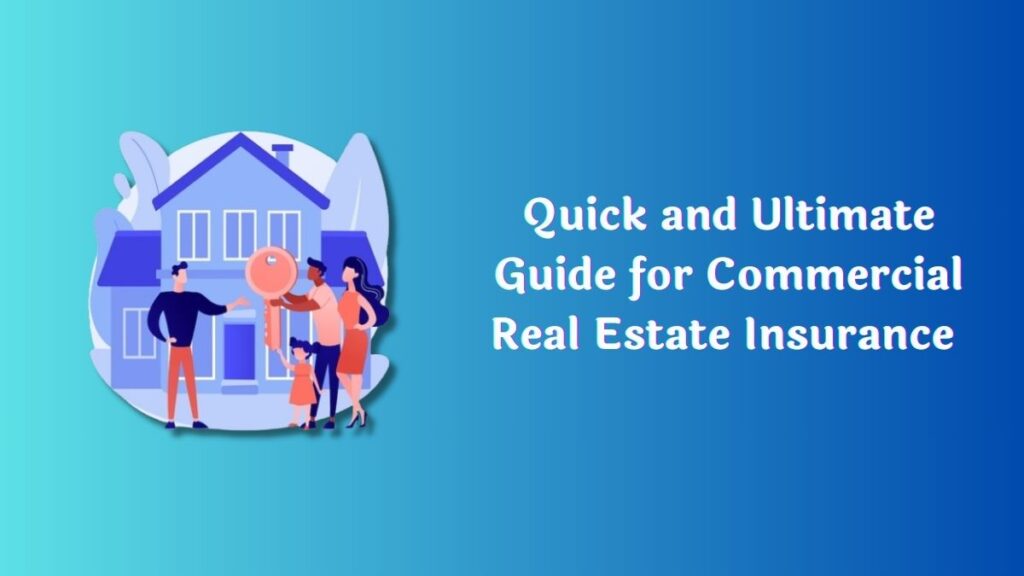In today’s dynamic business landscape, protecting your commercial real estate investment is paramount. Whether you own a single property or manage a portfolio, safeguarding against potential risks is essential for long-term success. Commercial real estate insurance serves as a vital tool in mitigating these risks and ensuring financial security

Commercial real estate insurance, often referred to as commercial property insurance, is a specialized type of insurance designed to protect property owners and managers from various hazards and liabilities. These hazards can range from natural disasters like hurricanes and earthquakes to man-made incidents such as vandalism or tenant lawsuits.
Importance of Commercial Real Estate Insurance
Investing in commercial properties involves significant capital and entails substantial risks. Without adequate insurance coverage, property owners expose themselves to potential financial ruin in the event of unforeseen circumstances. Commercial real estate insurance provides a safety net, offering protection against property damage, liability claims, loss of rental income, and more.
Types of Commercial Real Estate Insurance
Commercial real estate insurance policies typically encompass multiple coverage types tailored to the specific needs of property owners. Understanding these different types of insurance can help you customize a policy that adequately safeguards your investment.
1. Property Insurance
Property insurance is the foundation of commercial real estate insurance. It protects against damage to the physical structure of the property caused by perils such as fire, lightning, windstorms, vandalism, and theft. Property insurance policies can also cover business equipment, inventory, and other assets housed within the property.
2. Liability Insurance
Liability insurance provides protection against legal claims arising from injuries or property damage that occur on the insured property. This coverage extends to incidents involving tenants, visitors, or even trespassers. Liability insurance can help cover legal fees, medical expenses, and court-awarded damages in the event of a lawsuit.
3. Business Interruption Insurance
Business interruption insurance, also known as business income insurance, compensates property owners for lost rental income and operating expenses in the event that the property becomes temporarily uninhabitable due to a covered peril. This coverage ensures continuity of cash flow during the restoration period following a covered loss.
4. Flood Insurance
While standard property insurance policies cover many hazards, they often exclude flood damage. Given the increasing frequency of extreme weather events, obtaining flood insurance is crucial for properties located in flood-prone areas. Flood insurance provides compensation for damage caused by rising waters from sources such as rivers, lakes, and heavy rainfall.
5. Cyber Insurance
In an era of increasing digital interconnectedness, cyber insurance has become essential for commercial property owners. This type of insurance protects against losses resulting from cyberattacks, data breaches, and other cyber-related risks. Cyber insurance can cover expenses related to data recovery, legal liabilities, and reputation management.
How to Choose the Right Coverage
Selecting the appropriate commercial real estate insurance coverage requires careful consideration of various factors, including the type of property, its location, tenant occupancy, and risk exposure. Here are some steps to guide you in choosing the right coverage:
1. Assess Risks
Conduct a thorough risk assessment to identify potential hazards and liabilities associated with your property. Consider factors such as geographic location, weather patterns, building age, and tenant activities.
2. Evaluate Coverage Options
Work with an experienced insurance agent or broker specializing in commercial real estate to explore different coverage options. Assess the scope of coverage, policy limits, deductibles, and premium costs associated with each option.
3. Customize Your Policy
Tailor your insurance policy to address specific risks and protect against potential gaps in coverage. Consider adding endorsements or riders to enhance coverage for unique exposures such as earthquake or terrorism risks.
4. Review Regularly
Regularly review and update your insurance coverage to ensure it remains adequate and up-to-date with any changes in your property portfolio or risk profile. Reevaluate your coverage needs annually or whenever significant changes occur.
You Must See:-
- What is Auto Owners Insurance? Best Way’s to pay there primum in 2024
- How to Find Direct Auto Insurance? Best Way’s to Secure Your Plan in 2024
- What is Auto Owners Insurance? Best Way’s to pay there primum in 2024
Real Estate Insurance Related [FAQs]
Q1: Is commercial real estate insurance mandatory?
A: While commercial real estate insurance is not legally required in most cases, it is highly recommended for property owners to protect their investment and mitigate financial risks.
Q2: How much does commercial real estate insurance cost?
A: The cost of commercial real estate insurance varies depending on factors such as the value of the property, its location, occupancy type, coverage limits, and deductible amounts. Premiums typically range from 0.5% to 2% of the property’s insured value annually.
Q3: Can I bundle commercial real estate insurance with other policies?
A: Yes, many insurance providers offer package policies that bundle commercial real estate insurance with other coverages such as general liability, umbrella liability, and workers’ compensation. Bundling policies can often result in cost savings and streamlined coverage.
Q4: What is coinsurance in commercial real estate insurance?
A: Coinsurance is a clause commonly found in commercial property insurance policies that requires the insured to maintain coverage for a specified percentage of the property’s value. Failure to meet the coinsurance requirement can result in penalties or reduced claim payments in the event of a loss.
Conclusion
Commercial real estate insurance plays a vital role in safeguarding property owners against a wide range of risks and liabilities. By understanding the various types of coverage available and customizing policies to suit individual needs, property owners can protect their investments and ensure long-term financial security in an ever-changing business environment. Investing in comprehensive insurance coverage is not just a prudent financial decision—it’s essential for peace of mind and business continuity.